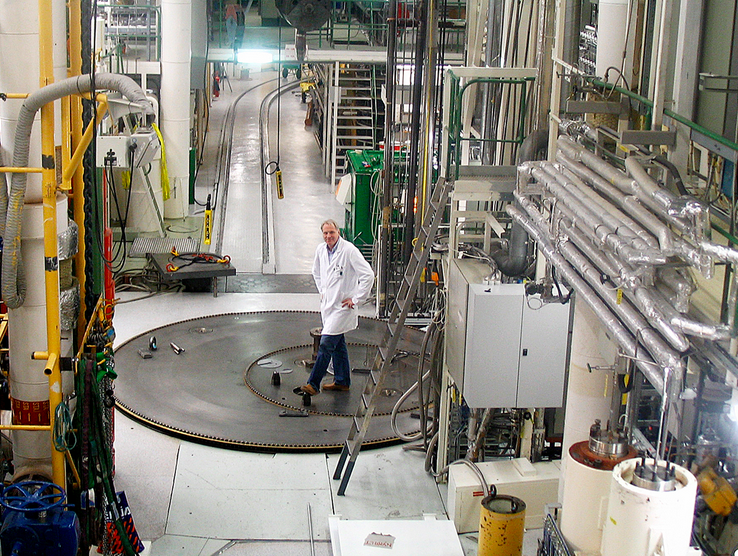
Arctic Frontiers: Disinformation, Security and the Northern Sea Route
Bellona held a seminar on countering Russian disinformation in the Arctic at the Arctic Frontiers international conference in Norway
News

Publish date: June 3, 2020
News
A Canadian nuclear company was among those that received doctored test results from Norway’s Halden reactor, the now-closed atomic research facility that has been enmeshed in a data-baking scandal involving several of its international customers.
Bellona, joined by several Norwegian politicians, has demanded a broad investigation into the incident, which could have serious safety implications for numerous nuclear reactors throughout the world.
Last month the Institute of Energy Technology, or IFE, which oversees the Halden reactor, announced that fabricated data had made its way to as many as seven of its past foreign clients in a scheme it called “planned and well-hidden.”
The findings stemmed from a whistleblower’s complaint. A third party investigation established that the results of several nuclear fuel tests conducted at Halden between 1990 and 2005 had been fabricated – and that falsifications were then sent to as many as seven major nuclear power operators, the IFE has said.
While the IFE has still not revealed precisely which customers were impacted by the cooked data, NRK, Norway’s public broadcaster has reported that the nuclear industries on three different continents – one of which includes Canada’s – were hit by the frauds.
Nils Morten Huseby, the IFE’s director, has said that at least one person was behind the data manipulation scheme, but added that the third party investigators hadn’t determined whether the person was employed directly by the institute or was an outside contractor. The case has been referred to Norway’s economic crimes unit.
In a letter to the IFE and the Norwegian Radiation and Nuclear Safety Authority, Bellona criticized the air of secrecy surrounding the scandal and demanded to know which countries’ nuclear industries have been affected by the manipulated data.
“We therefore ask who is behind it, why the tampering occurred and what the consequences will be,” Bellona writes. Which countries were the customers and which countries received data that have been tampered with?”
Norway’s Green Party and Socialist Left Party likewise demand answers.
 Protests at the Halden Reactor in 1990.
Credit: bellona
Protests at the Halden Reactor in 1990.
Credit: bellona
“As a society, we are completely dependent on the fact that we can rely on scientists not falsifying,” Une Bastholm of the Green Party told NRK. “By pursuing research cheating, which apparently has happened here, confidence is further undermined. This is a research ethics scandal.”
Lars Haltbrekken, environmental policy spokesman for the Socialist Left Party, agreed, telling the broadcaster: “We need to be fully clear about what has happened and what is being done to clean up the safety risk this may have created.”
Still, the IFE has thus far refused to divulge which of Halden’s customers may have received fabricated data, citing the economic crimes investigation – though investigators there have told NRK they aren’t yet sure whether they will treat the matter as a police investigation.
The Halden reactor, which is one of four research reactors run in Norway, began operations in 1955 and was shuttered in 2018 after a long period of financial difficulties and technical problems. Kvamme Associates, an Oslo-based anti-corruption research group, was brought in by the IFE to investigate the suspect data. The group provided its results to the Institute of Energy Technology, or IFE, Halden’s operator, in early May.
Many of Halden’s former customers are foreign governments and nuclear utilities that relied on Halden’s data to make decisions about how to fuel their own nuclear reactors. The purpose of research facilities like Halden is to simulate how various nuclear fuels behave under different circumstances, thus allowing nuclear power companies a greater margin of safety in their operations.
The investigation report, which IFE released to Bellona on May 14, shows that a number of fuel tests were fabricated either because researchers failed to meet test requirements, or because they ran up against deadlines they were unable to meet.
The Kvamme Associates report states that four international projects conducted at the Halden reactor were found to contain fabricated data. The independent review found that two of the cases involved no security or safety risks, while two other cases have not been fully evaluated.
Three other projects carried out at Halden are also under suspicion and are currently under review, NRK said.
“The Radiation and Nuclear Safety Authority is overseeing our investigation and has full access to all findings and assessments,” the IFE’s Huseby told NRK. “The IFE has put in all available resources to get all the facts on the table and clarify if this has had any safety implications. That work continues unabated.”
The falsified data scandal comes as a blow to the IFE, which until Halden’s closure had struggled with criticism that the reactor was too costly to the Norwegian public and had battled allegations that it was unsafe following a 2016 iodine leak.
The Halden reactor is the fourth of Norway’s research reactors, the first three of which operated in Kjeller, near Oslo, which began operations in 1951. For decades, Bellona questioned the Halden reactor’s sometimes-hazardous operations, and demanded that the government stop subsiding its continued use.
Over the course of its operation, Halden contributed some 10 tons of spent nuclear fuel to the 17 tons the country has amassed since the middle of the last century.

Bellona held a seminar on countering Russian disinformation in the Arctic at the Arctic Frontiers international conference in Norway

Our December Nuclear Digest, reported by Bellona’s Environmental Transparency Center, is out now. Here’s a quick taste of three nuclear issues arisin...

Bellona has launched the Oslofjord Kelp Park, a pilot kelp cultivation facility outside Slemmestad, about 30 kilometers southwest of Oslo, aimed at r...

Our November Nuclear Digest by Bellona’s Environmental Transparency Center is out now. Here’s a quick taste of just three nuclear issues arising in U...